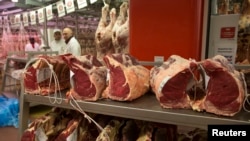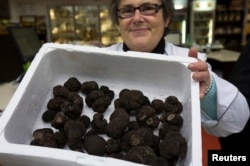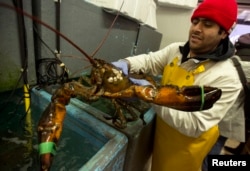At the temple to gastronomy outside Paris, Rungis market, Marinette shows off a tray of fat white truffles from Italy, at 1,800 euros a kilo ($1,000 per pound).
“Put your nose in there,” she tells her customers, who brave the early morning hours to supply restaurants and retailers throughout France and beyond during the lead-up to Christmas.
Rungis, the largest fresh food market in the world, is abuzz the week before Christmas as wholesalers sell everything from oysters and salmon to gruyere, green beans and sides of beef.
Located a few kilometers (miles) south of Paris, Rungis is spread over 234 hectares, making is just a bit larger than the sovereign state of Monaco. Some 12,000 employees make this well-oiled machine run to the tune of 9 billion euros in sales each year, up 3.8 percent from 2012 to 2013.
“I've worked here for 35 years!” Marinette said. “I love truffles, caviar and also foie gras. I know all the sellers here - the atmosphere is great.”
Rungis, built to replace the old Les Halles market in Paris that closed in 1969, is a massive source of economic growth, supporting an estimated 102,000 jobs throughout the country.
When the doors open each morning at 2:00 a.m., the first buyers are usually sushi chefs who value selection over price. Later buyers look for a bargain, when prices are cut for quick sale.
Hardest for seafood sellers - who sell about 200 kilos of fish a day - is knowing how much to buy as more restaurants place last-minute orders due to uncertain client demand, which increases the risk of too much stock.
“With ten days before Christmas, they're under a lot of stress,” said David Bourganel, development director at Rungis.
Three thousand restaurants buy directly in person from Rungis each morning, while another 30,000 from as far away as Asia and the Middle East receive deliveries.
Oysters, salmon and turkeys are the big holiday items, with prices rising with demand. A lobster costing 20 to 30 euros per kilo in June will be twice that in December, sellers said.
By 5:00 a.m., the activity is in the Le Saint-Hubert cafe adjacent to the meat hall, where butchers in bloodied white smocks gather around the zinc bar to warm up over a glass of wine or beer.
“You get thirsty,” quipped Eric, a meat-cutter with 30 years under his belt at Rungis, who said that despite the cold feet and late hours, working at Rungis is lively and convivial.
“It's really about relationships, and you see a lot of fathers and sons. It's a lot of camaraderie.”







